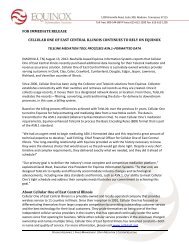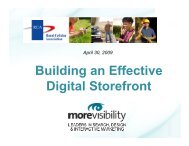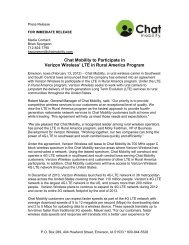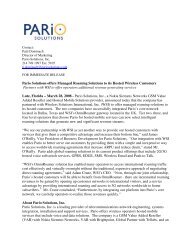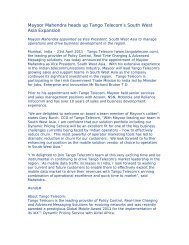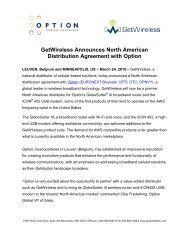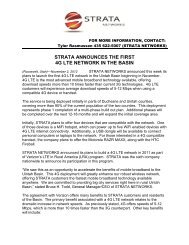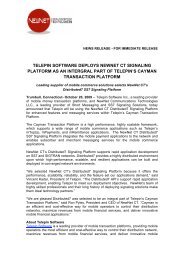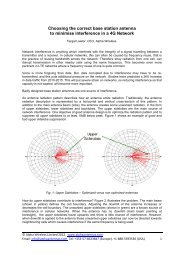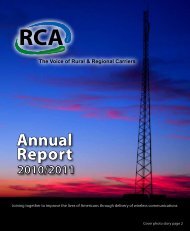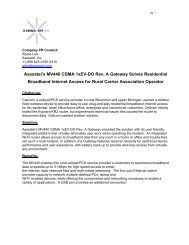Details - Competitive Carriers Association
Details - Competitive Carriers Association
Details - Competitive Carriers Association
You also want an ePaper? Increase the reach of your titles
YUMPU automatically turns print PDFs into web optimized ePapers that Google loves.
The Washington Monitor<br />
Page 7<br />
much more common, submit a new Local Service Request to Verizon.<br />
Section 222(b) provides that “[a] telecommunications carrier that receives or obtains<br />
proprietary information from another carrier for purposes of providing any<br />
telecommunications service shall use such information only for such purpose, and shall not<br />
use such information for its own marketing efforts.” The Commission found that a<br />
telecommunications carrier violates section 222(b) when it (a) receives or obtains proprietary<br />
information; (b) from another carrier; (c) for purposes of providing any telecommunications<br />
service; and (d) fails to use such information “only” for such purpose, or uses the information<br />
“for its own marketing efforts.” Verizon’s retention marketing program thus was found to<br />
violate section 222(b) of the Act.<br />
The proprietary information obtained by Verizon consisted of knowledge that a<br />
competing carrier had persuaded a particular Verizon customer to switch to a particular<br />
competing carrier’s voice service on a particular date. This information cannot be used by<br />
Verizon to engage in retention marketing.<br />
The Commission found that when a competitive carrier submits a Local Service<br />
Request (LSR) to Verizon, Verizon receives the LSR “for purposes of providing any<br />
telecommunications service” within the meaning of section 222(b). That conclusion,<br />
combined with the conclusion reached above about the LSR’s proprietary nature, means that<br />
section 222(b) forbids Verizon from using the information in the LSR for its own marketing<br />
efforts.<br />
The Commission disagreed with the argument that Local Number Portability (LNP) is<br />
not a telecommunications service because it does not constitute transmission, and because it<br />
is not offered for a fee. Rather, number portability is a wholesale input that is a necessary<br />
component of a retail telecommunications service. Services or functions that are “incidental<br />
or adjunct to common carrier transmission service” – i.e., they are “an integral part of, or<br />
inseparable from, transmission of communications” – should be classified as<br />
telecommunications services. LNP similarly constitutes such an “adjunct to basic” service.<br />
As a result, Verizon’s provision of LNP was found to be a telecommunications service for<br />
purposes of section 222(b).<br />
Verizon lost the argument that affiliates of complainants Bright House Networks,<br />
LLC, Comcast Corporation and Time Warner Cable, Inc. do not provide telecommunications<br />
services. The Commission found that the companies are telecommunications carriers and<br />
provide telecommunications services for purposes of the privacy protections provided by<br />
Section 222(b). This does not mean that they are “telecommunications carriers” for purposes<br />
of all other provisions of the Act. Those determinations are left for another day.<br />
Commission Chairman Martin disagreed with the holding that the complainants are<br />
“telecommunications carriers” for one purpose and not for another, such as complying with<br />
the obligations of “telecommunications carriers.” He expressed concern that the “decision<br />
promotes regulatory arbitrage and is outcome driven; it could thwart competition, harm rural<br />
America, and frustrate regulatory parity.” Noting that cable companies engage in aggressive



